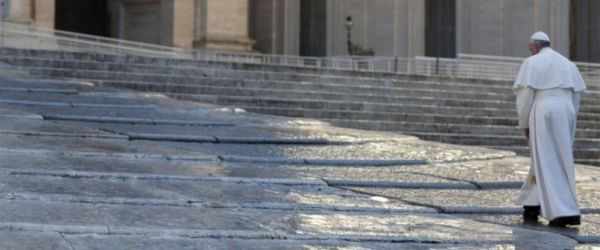This Sunday we turn to a reading from the Gospel of Mark. In today’s passage (cf. Mk 7:1-8, 14-15, 21-23), Jesus addresses an important topic for all of us believers: the authenticity of our obedience to the Word of God, against any worldly contamination or legalistic formalism. The narrative opens with the objection that the scribes and Pharisees address to Jesus, accusing his disciples of failing to observe the ritual precepts according to tradition. In this way, those challenging him seek to strike at the reliability and authority of Jesus as Teacher because they say: “But this teacher allows his disciples to evade the prescriptions of tradition”. But Jesus responds emphatically; he responds by saying: “Well did Isaiah prophesy of you hypocrites, as it is written, ‘This people honours me with their lips, but their heart is far from me; in vain do they worship me, teaching as doctrines the precepts of men’” (vv. 6-7). This is what Jesus says. Clear and emphatic words! ‘Hypocrite’ is, so to speak, one of the strongest adjectives that Jesus uses in the Gospel, and he speaks them as he addresses the teachers of religion: doctors of the law, scribes.... ‘Hypocrite’, Jesus says.
Indeed, Jesus wants to rouse the scribes and Pharisees from the error they have fallen into, and what is this error? That of distorting God’s will, neglecting his commandments in order to observe human traditions. Jesus’ reaction is severe because something great is at stake: it concerns the truth of the relationship between man and God, the authenticity of religious life. A hypocrite is a liar; he is not authentic.
Today too, the Lord invites us to avoid the danger of giving more importance to form than to substance. He calls us to recognize, ever anew, what is the true core of the experience of faith, that is, love of God and love of neighbour, by purifying it of the hypocrisy of legalism and ritualism.
Today’s Gospel message is also reinforced by the voice of the Apostle James, who tells us, in brief, what true religion is meant to be, and he says: pure religion is “to visit orphans and widows in their affliction, and to keep oneself unstained from the world” (Jas 1:27). “To visit orphans and widows” means to practice charity toward neighbours, beginning with the neediest, frailest, most marginalized people. They are the people whom God takes care of in a special way, and he asks us to do the same.
“To keep oneself unstained from the world” does not mean to isolate oneself and close oneself off from reality. No. Here too there must be not an exterior attitude, but interior, substantive: it means being vigilant so that our way of thinking and acting may not be polluted by the worldly mentality, or that of vanity, of greed, of arrogance. Actually, a man or woman who lives in vanity, in greed or in arrogance and at the same time believes and shows him or herself as being religious and even goes so far as to condemn others, is a hypocrite.
Let us make an examination of conscience to see how we embrace the Word of God. On Sunday we listen to it at Mass. If we listen to it in a distracted or superficial way, it will not be of much use. Instead, we must welcome the Word with open minds and hearts, as good soil, in a way that it may be assimilated and may bear fruit in real life. Jesus says that the Word of God is like wheat; it is a seed that must grow in practical deeds. In this way the Word itself purifies our heart and actions, and our relationship with God and with others is freed from hypocrisy.
May the example and intercession of the Virgin Mary help us to always honour the Lord with our heart, witnessing to our love for him in concrete choices for the good of our brothers and sisters.
[Pope Francis, Angelus 2 September 2018]












